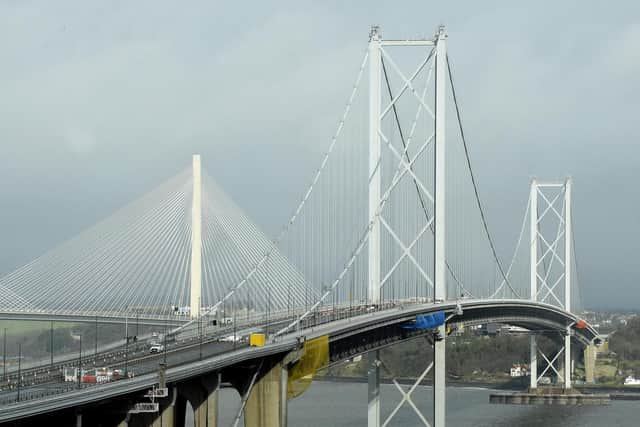Queensferry Crossing: Speed limit to be imposed as cables are cleaned for ice mitigation trial
and live on Freeview channel 276
Work will start on Monday, August 30, and will take around five to six weeks.
The speed limit will be put in place from Monday to Friday between approximately 7am to 6pm, while the rope access teams are working overhead.
Advertisement
Hide AdAdvertisement
Hide AdThe cables will be cleaned with soap and water, as part of a trial to find out the impact of soiling on the formation of ice.


Since its opening in 2017, the Queensferry Crossing has been closed to traffic three times due to a risk of ice falling from the cables and towers.
Engineers led by Transport Scotland’s operating company BEAR Scotland have been investigating potential measures to mitigate or prevent the problem.
Chris Tracey, BEAR Scotland’s Unit Bridges Manager for South East Scotland, said: “We appreciate that some drivers may find the reduced speed limit during the works frustrating, however this is an essential safety measure and will only be implemented when necessary.”
Advertisement
Hide AdAdvertisement
Hide AdHe explained the reasoning behind the trial, and said: “Since the Queensferry Crossing opened to traffic, dust and dirt has accumulated on the cables. These tiny particles may be helping ice to accrete as crystals form around them.
“The first cables were installed in 2015 and there are no records of any ice forming on them until 2019.”
“By cleaning the cables on one tower we will be able to measure the impact this has. As part of the project, thermal cameras are being installed at the top of each tower to monitor and measure any formation of ice.”
In total, 96 cables will be cleaned, which range in length from 94 to 420 metres. Over 24 kilometres of cable will be cleaned in total.
Advertisement
Hide AdAdvertisement
Hide AdThe cleaning will be carried out by rope access technicians, who will access the cables by abseiling from the top of the 207-metre concrete tower.
Tracey said: “On this occasion the cleaning will be carried out by rope access technicians, however work is also progressing on the design of a machine to carry out this task in future, should the trial prove successful.”
Alongside the trial being being held on the bridge, tests will also be carried out in October, at the Jules Verne climatic wind tunnel, a research facility at the Scientific and Technical Centre for Building in Nantes, France. This facility can replicate all kinds of different weather conditions.
The tests held in France will allow the BEAR Scotland team to test the impact of cleaning on a full section of the cables used on the Queensferry Crossing.
Advertisement
Hide AdAdvertisement
Hide AdTracey added: “We’ve already installed a range of sensors to measure the conditions in which ice forms, and these trials will further improve our understanding of the process. The ultimate aim is to design measures to mitigate or prevent the problem.”
The Queensferry Crossing, which opened to traffic on 30 August 2017, was the result of a £1.35 billion investment from the Scottish Government.
A message from the Editor:
Thank you for reading this article. We're more reliant on your support than ever as the shift in consumer habits brought about by coronavirus impacts our advertisers.
If you haven't already, please consider supporting our trusted, fact-checked journalism by taking out a digital subscription.
Comment Guidelines
National World encourages reader discussion on our stories. User feedback, insights and back-and-forth exchanges add a rich layer of context to reporting. Please review our Community Guidelines before commenting.